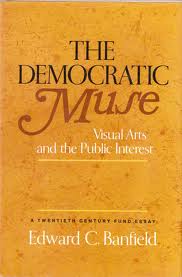New York: Basic Books, 1984.
“Banfield’s book is about the following subjects: various definitions of artistic purpose and activity; the legislative and political histories of the National Endowment for the Arts; the administration of that agency; the operation and raison d’etre of public museums; the costs and benefits of teaching art in schools; the economic ethics-or at least the value-of exhibiting and collecting original works of art as opposed to copies; fine arts and crafts; art as a form of welfare; and art as a public interest…. I hope that readers of The Democratic Muse will concentrate on its indisputable virtues. Banfield has done for culture what Milton Friedman has elsewhere done for industry: He has given us a realistic picture of a market shaped and distorted by intervention. Friedman calls the relationship of legislators, bureaucrats, and beneficiaries ‘the iron triangle.’ Friedman’s example is the tobacco industry, Banfield’s is the culture industry. Both show, with remarkable persuasiveness, how congressional committees become involved not with the rights of the interests they oversee but with their success. Legislation nearly always begins by addressing an inequity or a problem of some kind, and nearly always ends by eternalizing a subsidy.” — Ronald Berman
Online:
Amazon

